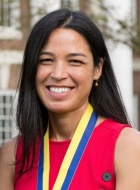Millicent O. Sullivan
Professor and Chair
University of Delaware
Department of Chemical and Biomolecular Engineering
+Amol Ajinkya Memorial Fund Lecture
Live broadcast available:
ZOOM Link
PW: UBCBE1
Unlocking Intracellular Therapeutic Targets through Novel Nanostructured Biomaterials
Nucleic acid cargoes offer unmatched diversity in gene regulatory potential and therapeutics, and understanding of nucleic acid functionality continues to expand rapidly and dramatically through seminal discoveries including RNA interference approaches and gene editing technologies. In nature, the basis for gene regulation is ultimately encoded by the exquisite specificity with which cells are able to control both the location and accessibility of nucleic acid constructs to govern their activation states. My research program seeks to understand and control gene activation using synthetic constructs through nature-inspired approaches to control and quantify cell binding interactions and stability in polymer and peptide nanocarriers. The basis of our approaches is the design of stimuli-responsive polymers and peptides whose interactions with nucleic acids and cells can be controlled dynamically by specific intracellular or external triggers. We exploit our ability to control nucleic acid binding/release and cellular processing to gain new mechanistic insights over nucleic acid delivery, leading to design advances including histone-inspired DNA targeting, light-responsive gene silencing, and collagen turnover-stimulated gene expression. This talk will highlight ways we have used nature-inspired peptides and responsive polymers to control gene transfer in regenerative medicine.
ZOOM Link
PW: UBCBE1
Bio
Millicent Sullivan is the Alvin B. and Julie O. Stiles Professor and Chair of the Department of Chemical & Biomolecular Engineering, and a Professor in Biomedical Engineering at University of Delaware. Millie graduated from Princeton University with a B.S.E. degree in Chemical Engineering and a Certificate in Engineering Biology in 1998. Subsequently, she attended Carnegie Mellon University as a Clare Boothe Luce Graduate Fellow, where she earned her Ph.D. degree in Chemical Engineering with Professor Todd Przybycien in 2003. As a Ruth L. Kirchstein NIH postdoctoral fellow, Millie worked with Professor E. Helene Sage in the Matrix Biology/Hope Heart Program of the Benaroya Research Institute. In 2006, Millie moved to the University of Delaware. Her laboratory develops new biomaterials for drug delivery, gene delivery, and tissue engineering, with therapeutic targets including metastatic breast cancer, bone repair, wound healing, and cardiovascular repair. Additionally, her lab recently began working in synthetic cell design using engineered polypeptides. Specific fundamental foci include de novo peptide design, peptide and polymer self-assembly, and subcellular processing mechanisms. Sullivan is Core Director in the Delaware COBRE Center for Musculoskeletal Research, a member of the Penn Center for Targeted Therapeutics and Translational Nanomedicine (CT3N), and an Affiliate Member of the Delaware Biotechnology Institute. She is an AIMBE fellow, past Standing Member of the Gene and Drug Delivery (GDD) study section at NIH, and Honorary Professor of Chemical Engineering at the University of Melbourne, and she has been the recipient of awards and honors including a Fulbright Future Award, the Centennial Professorship, the NSF CAREER Award, and the Merck Faculty Fellow Award.
Wednesday, September 28, 2022
- Time: 11:00 AM
- Location: 206 Furnas Hall
- Seminar Flyer

Millicent O. Sullivan
Professor and Chair
Department of Chemical and Biomolecular Engineering
University of Delaware